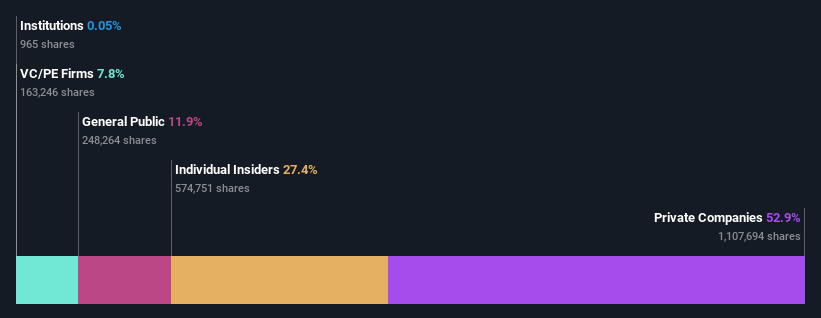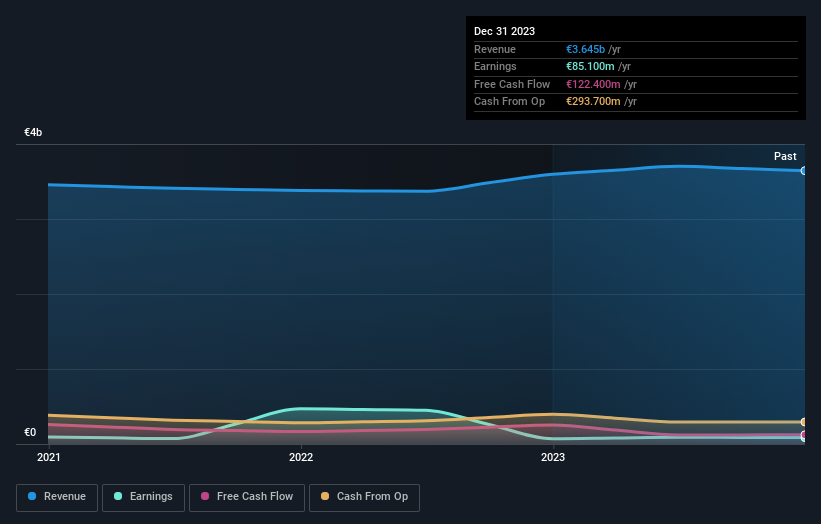Stock Analysis
Unibel S.A.'s (EPA:UNBL) market cap rose €105m last week; private companies who hold 53% profited and so did insiders

Key Insights
- Unibel's significant private companies ownership suggests that the key decisions are influenced by shareholders from the larger public
- The top 2 shareholders own 59% of the company
- Insiders own 27% of Unibel
To get a sense of who is truly in control of Unibel S.A. (EPA:UNBL), it is important to understand the ownership structure of the business. We can see that private companies own the lion's share in the company with 53% ownership. Put another way, the group faces the maximum upside potential (or downside risk).
While private companies were the group that reaped the most benefits after last week’s 5.3% price gain, insiders also received a 27% cut.
In the chart below, we zoom in on the different ownership groups of Unibel.
View our latest analysis for Unibel

What Does The Lack Of Institutional Ownership Tell Us About Unibel?
Institutional investors often avoid companies that are too small, too illiquid or too risky for their tastes. But it's unusual to see larger companies without any institutional investors.
There could be various reasons why no institutions own shares in a company. Typically, small, newly listed companies don't attract much attention from fund managers, because it would not be possible for large fund managers to build a meaningful position in the company. On the other hand, it's always possible that professional investors are avoiding a company because they don't think it's the best place for their money. Unibel's earnings and revenue track record (below) may not be compelling to institutional investors -- or they simply might not have looked at the business closely.

Hedge funds don't have many shares in Unibel. Our data shows that Comptoir Général des Fromagers Français is the largest shareholder with 32% of shares outstanding. For context, the second largest shareholder holds about 27% of the shares outstanding, followed by an ownership of 11% by the third-largest shareholder. Antoine Fievet, who is the second-largest shareholder, also happens to hold the title of Member of Management Board.
To make our study more interesting, we found that the top 2 shareholders have a majority ownership in the company, meaning that they are powerful enough to influence the decisions of the company.
While it makes sense to study institutional ownership data for a company, it also makes sense to study analyst sentiments to know which way the wind is blowing. We're not picking up on any analyst coverage of the stock at the moment, so the company is unlikely to be widely held.
Insider Ownership Of Unibel
The definition of company insiders can be subjective and does vary between jurisdictions. Our data reflects individual insiders, capturing board members at the very least. Management ultimately answers to the board. However, it is not uncommon for managers to be executive board members, especially if they are a founder or the CEO.
I generally consider insider ownership to be a good thing. However, on some occasions it makes it more difficult for other shareholders to hold the board accountable for decisions.
Our information suggests that insiders maintain a significant holding in Unibel S.A.. It has a market capitalization of just €2.1b, and insiders have €575m worth of shares in their own names. That's quite significant. It is good to see this level of investment. You can check here to see if those insiders have been buying recently.
General Public Ownership
With a 12% ownership, the general public, mostly comprising of individual investors, have some degree of sway over Unibel. While this size of ownership may not be enough to sway a policy decision in their favour, they can still make a collective impact on company policies.
Private Equity Ownership
With a stake of 7.8%, private equity firms could influence the Unibel board. Some investors might be encouraged by this, since private equity are sometimes able to encourage strategies that help the market see the value in the company. Alternatively, those holders might be exiting the investment after taking it public.
Private Company Ownership
Our data indicates that Private Companies hold 53%, of the company's shares. It might be worth looking deeper into this. If related parties, such as insiders, have an interest in one of these private companies, that should be disclosed in the annual report. Private companies may also have a strategic interest in the company.
Next Steps:
It's always worth thinking about the different groups who own shares in a company. But to understand Unibel better, we need to consider many other factors. For example, we've discovered 2 warning signs for Unibel (1 is significant!) that you should be aware of before investing here.
Of course this may not be the best stock to buy. So take a peek at this free free list of interesting companies.
NB: Figures in this article are calculated using data from the last twelve months, which refer to the 12-month period ending on the last date of the month the financial statement is dated. This may not be consistent with full year annual report figures.
Valuation is complex, but we're helping make it simple.
Find out whether Unibel is potentially over or undervalued by checking out our comprehensive analysis, which includes fair value estimates, risks and warnings, dividends, insider transactions and financial health.
View the Free AnalysisHave feedback on this article? Concerned about the content? Get in touch with us directly. Alternatively, email editorial-team (at) simplywallst.com.
This article by Simply Wall St is general in nature. We provide commentary based on historical data and analyst forecasts only using an unbiased methodology and our articles are not intended to be financial advice. It does not constitute a recommendation to buy or sell any stock, and does not take account of your objectives, or your financial situation. We aim to bring you long-term focused analysis driven by fundamental data. Note that our analysis may not factor in the latest price-sensitive company announcements or qualitative material. Simply Wall St has no position in any stocks mentioned.
About ENXTPA:UNBL
Acceptable track record and slightly overvalued.

